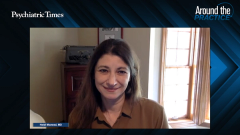
Pharmacological Treatment Approaches
Thomas E. Scammell, MD; Heidi Moawad, MD; Phyllis C. Zee, MD, PhD; and Ruth Benca, MD, PhD, discuss the advantages and disadvantages of specific drug mechanisms for the treatment of narcolepsy.
Episodes in this series

Thomas E. Scammell, MD: Dr. Moawad, we talked a lot about the behavioral and vocational aspects of this. Let's talk a little bit about the actual medications Let's start off with some of the traditional meds. Do you want to comment on how you see modafinil, armodafinil, amphetamines, sodium oxybate fitting in?
Heidi Moawad, MD: Well, they are effective. The main thing is that they have been around for a long time. People use them and when patients use these as directed, they will notice improvement and that in and of itself helps with compliance and it helps with symptoms, helps with overall quality of life. These kinds of things are not to be used for treating depression, even though a lot of patients who have depression obviously will feel a little bit better because they're having fewer symptoms of their narcolepsy. But I just think they've been around for a long time, and people report success, those who are compliant.
Thomas E. Scammell, MD: If you have somebody who, let's just for the sake argument, has relatively mild sleepiness regarding these sorts of traditional medications. What would you turn to initially?
Heidi Moawad, MD: I think for a typical patient, who is not on a lot of other things, I would probably try modafinil and they would, for the most part, do better and have fewer symptoms. I think that would really be the first choice.
Thomas E. Scammell, MD: Do you make much of a distinction between modafinil and armodafinil?
Heidi Moawad, MD: Not necessarily. I wonder if one of the others could comment on that.
Phyllis C. Zee, MD, PhD: Most of my patients are more likely to be on armodafinil than modafinil, although initially, they were all on modafinil, I'm not sure. I think that may be part of the cost issue. Also, there are different doses for modafinil. The lowest dose is different from modafinil and armodafinil. So, I think most of my patients are on armodafinil. I don't think I have a preference, although supposedly armodafinil may have a longer period of action. I have not found that. I have patients take armodafinil twice a day as well.
Thomas E. Scammell, MD: I think my experience has been, it's mainly a question of whichever is less expensive on that insurer's formulary. But I tend to use them interchangeably. Dr. Zee, let's say you have a patient with more substantial sleepiness, say an Epworth score of say 17 or something like that. Do you think it's worth starting with modafinil or would you jump in with something else?
Phyllis C. Zee, MD, PhD: I still will start them on one of the modafinil or armodafinil. I don't think we have data to show that if you're more sleepy on the Epworth Sleepiness Scale, that you're less likely to respond. I don't know of it. I'm not sure that there is that data. I would start with that because of the safety and, also, I think just practicality and cost of the medication. Of course, that may be different in a woman who may not want to be on birth control methods and so forth; that could change my thoughts. Of course, we have patients on amphetamine or amphetamine-like derivatives. So that is something that would probably be a second line if they fail modafinil or armodafinil or even if I go higher on the dose of modafinil.
Thomas E. Scammell, MD: The European treatment guidelines really push amphetamines to the background. Do you use them much in your patients?
Phyllis C. Zee, MD, PhD: My patients, I would say about 30 to 40 percent, are on some type of amphetamine-like substance, but more intermittently, that would be more of what they do. For example, when they need to be driving, when they need to do something, they may then add 10 milligrams of methylphenidate for example or something of that sort. I do have a number of patients that are on both modafinil and a smaller dose of amphetamine. I try not to have high levels of that, and that's how I actually use modafinil to kind of decrease the amount of amphetamines that the individual may need.
Thomas E. Scammell, MD: I like that idea. Essentially you use modafinil to lay a foundation.
Phyllis C. Zee, MD, PhD: I would say create a baseline; smooth things out during the day. That's what I tell them.
Thomas E. Scammell, MD: And then because some of the amphetamines are short-acting, they are nice as a PRN where they can take them later in the day without necessarily messing up their sleep if it's not after dinner time or something like that.
Ruth Benca, MD, PhD: I think it's also the case that patients sometimes have a fluctuation in their symptoms. Particularly the ones that are not the super severe excessively sleepy patient, some days they have more trouble than others. And having the ability to add in some medication as needed is helpful to them.
Thomas E. Scammell, MD: Dr. Benca, do you want to talk a little bit more about oxybates?
Ruth Benca, MD, PhD: Well, I'll talk about it from my psychiatric hat. Certainly, sodium oxybate is something that is quite helpful to patients who have cataplexy and I pretty much only use it in patients with cataplexy. But the other thing I think for psychiatrists to be aware of is that there are psychiatric side effects of sodium oxybate. In particular, there have been reports of psychosis developing as well as cases of bipolar disorder triggered by oxybate. We want to be careful with that medication and be aware of that. I tell psychiatrists you're more likely to see side effects of sodium oxybate than ever use it yourself.
Thomas E. Scammell, MD: And I think worsening depression.
Ruth Benca, MD, PhD: Absolutely. And suicidality.
Thomas E. Scammell, MD: When I'm prescribing an oxybate this is part of that initial conversation of whether that person is psychiatrically solid enough to be able to take it safely.
Ruth Benca, MD, PhD: Because it can unmask things or worsen tendencies that patients have, particularly for mood disorders or suicide.
Phyllis C. Zee, MD, PhD: One of the potential benefits of sodium oxybate, other than cataplexy, is in a patient who may have prominent sleep fragmentation or disruption. So occasionally that helps me weigh that versus the amphetamines or just awake-promoting agents.
Thomas E. Scammell, MD: Could I just ask for clarification, Dr. Benca? You had talked about using oxybates in your patients with cataplexy. Are you using it because you think it's a great drug for cataplexy, or are you using it because patients with cataplexy tend to have more substantial sleepiness as well?
Ruth Benca, MD, PhD: A bit of both. And if other treatments that I try for cataplexy, like some of the antidepressants, aren't working, I may add that in. And again, I agree with Dr. Zee about the patients who have fragmented sleep. I think back and there been a couple of cases that I've seen where patients didn't come in complaining at all about excessive sleepiness but complained that they just kept waking up at night and couldn't get a solid night of sleep. When we tested them, they turned out to have narcolepsy. So that can be a significant symptom in some patients, and sodium oxybate would be something that I would consider in that case, particularly if there's cataplexy as well.
Thomas E. Scammell, MD: If you saw a patient who only recorded spontaneous awakenings during the night, but not a lot of sleepiness, would you be thinking of narcolepsy?
Ruth Benca, MD, PhD: No.
Thomas E. Scammell, MD: We see plenty of insomnia patients like that.
Ruth Benca, MD, PhD: Insomnia patients complain that they are tired and fatigued, but they are not falling and cannot ever fall asleep. So no, that's a whole different ballgame. But patients who fall asleep during the day think it is because they didn’t sleep at night. I think one of the things in sleep that we see is patients tend to interpret their symptoms. If they don't feel good during the day, they assume it's because they didn't sleep well at night, or they attribute it to feeling depressed. They create these stories about why they are feeling the way they are and what they are attributing it to, which may or may not be accurate.
Transcript edited for clarity
Newsletter
Receive trusted psychiatric news, expert analysis, and clinical insights — subscribe today to support your practice and your patients.












